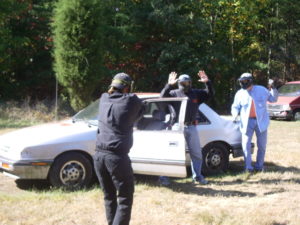Daniel Coyle is the author of the book The Talent Code. He conducts outstanding research in the field of enhancing human performance. His blog post, Your Best Training Session Ever, got me thinking about how a lot of firearms and combatives force-on-force training could be dramatically improved.
Read Daniel’s account of a trauma surgeon talking about the best training session he had ever witnessed. It was what the author calls a “live action role play,” essentially the same type of scenario-based training that we combatives instructors hold up as the pinnacle of training for our students.
A lot of us are doing force on force scenario training, but many aren’t doing it correctly. One simple modification in the structure of your training might make the difference between your students actually learning the material and just going through the motions.
Look again at the article and the author’s list of key features for scenario-based training:
- 1) You’re pretending to be someone you’re not (yet, anyway)
- 2) You perform in “live” conditions, with real emotional pressure
- 3) You get vivid, speedy feedback
- 4) You repeat it over and over
Which of these aspects is missing in the training you do with your students?
For most of us, it is the final factor, repetition. Due to time constraints, we often put our students through a scenario, verbally debrief them about their mistakes and then move on. That’s not the best way for them to learn.
Instead, after your verbal debrief, set up the scenario again. You don’t have to re-run the entire scenario, just the parts where your student performed less than adequately. Place the student back in the scenario and make him do it correctly under pressure. We want to have students leave our training feeling good about their performance, not feeling criticized. Allowing the student to “replay” the scenario until he achieve success is critical if we want this to happen.
Something else to consider….
If we are only giving students one chance at a scenario, what happens when they screw up? What happens is that we are actually letting them practice failure in the context of stressful, realistic combative conditions. That doesn’t lead to positive outcomes. Why do you allow your students to practice something that doesn’t work? Scenario based training is a way to learn. Too many of us treat it as a pass/fail test.
If we want our students to learn, we shouldn’t let them practice failing. If my student is doing very poorly in a scenario, I will stop the scenario, talk to the student, and remediate the problems immediately so that the student doesn’t get practice doing something wrong. This type of immediate correction and feedback is far more effective than a verbal debrief after a scenario is failed.
If you conduct force on force training, you owe it to your students to do it the right way.

Carjacking force on force training scenario at TDI

